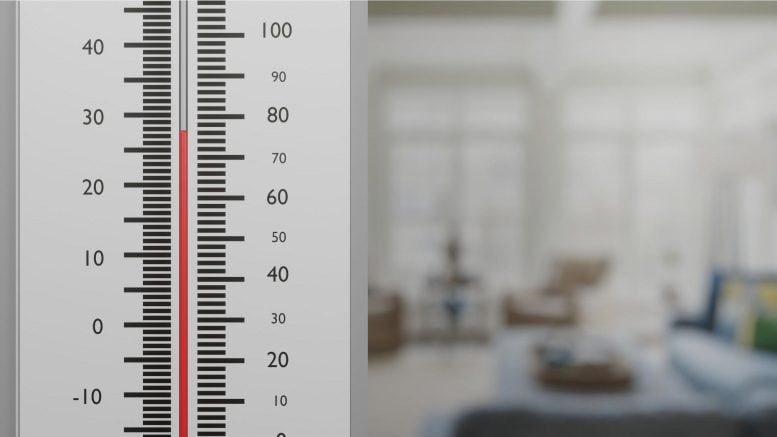 精选
精选
科学家警告:你家里的温度可能会增加你认知能力下降的风险
诸平
据美国希伯来老龄化研究所(Hebrew SeniorLife Hinda and Arthur Marcus Institute for Aging Research, Boston, MA, USA)2025年1月19日提供的消息,科学家警告:你家里的温度可能会增加你认知能力下降的风险(Scientists Warn: Your Home Temperature Could Be Increasing Your Risk of Cognitive Decline)。温度升高与认知能力下降的风险增加有关。一项开创性的研究揭示了室内温度与老年人认知能力之间的密切联系,强调了气候变化如何增加认知健康的风险。
隶属于美国哈佛医学院(Harvard Medical School, Boston, MA, USA)的欣达和亚瑟·马库斯老龄化研究所(Hebrew SeniorLife的一部分)的研究人员发现,当家里的温度保持在68~75 ℉(20~24 ℃)之间时,老年人的注意力困难最少。当温度在这个范围上下移动7 ℉(4 ℃)时,注意力问题的风险就会增加一倍。相关研究结果于2024年12月3日已经在《老年学杂志:A辑(生物学与医学)》{The Journals of Gerontology: Series A (Biol Sci Med Sci)}网站发表——Amir Baniassadi, Wanting Yu, Thomas Travison, Ryan Day, Lewis Lipsitz, Brad Manor. Home Ambient Temperature and Self-reported Attention in Community-Dwelling Older Adults. The Journals of Gerontology: Series A (Biol Sci Med Sci), 2024: glae286. DOI: 10.1093/gerona/glae286. Published: 03 December 2024. https://doi.org/10.1093/gerona/glae286
研究详情及结果(Study Details and Findings)
这项纵向观察研究在一年的时间里监测了47名65岁及以上的成年人的家庭温度和自我报告的注意力困难。发表在《老年医学杂志A辑》(Journal of Gerontology: Series A)上的研究结果表明,即使是目前的气候条件,也会使老年人处于危险之中,许多老年人的室内温度可能会损害他们的认知能力。这种影响对低收入和服务不足的人群尤其令人担忧,因为他们可能没有多少资源来管理他们的家庭环境。
上述研究论文的第一作者、欣达和亚瑟·马库斯老龄化研究所助理科学家(Assistant Scientist II)、研究气候变化对老年人影响的主要专家埃米尔·巴尼亚萨蒂(Amir Baniassadi)博士说:“我们的研究结果强调了了解环境因素(如室内温度)如何影响老年人认知健康的重要性。这项研究强调,需要采取公共卫生干预措施和住房政策,优先考虑老年人的气候适应能力。随着全球气温上升,确保进入温度控制的环境对于保护他们的认知健康至关重要。”
更广泛的背景和建议的解决方案(Broader Context and Proposed Solutions)
在2023年的一项研究测量了温度如何影响老年人的睡眠和认知能力之后,这项研究目前增加了越来越多的证据,表明气候变化的影响不仅限于身体健康,还包括认知功能,强调了采取积极措施的必要性。潜在的解决方案包括整合智能家居技术来优化室内温度,提高住房的能源效率,以及扩大调控资源的使用范围。
该研究得到了美国国家老龄化研究所T32奖学金{T32 fellowship through the U.S. National Institute on Aging (T32AG023480)}和TMCITY基金会(TMCITY foundation)的支持。
上述介绍,仅供参考。欲了解更多信息,敬请注意浏览原文或者相关报道。
Background: Climate change is expected to disrupt weather patterns across the world, exposing older adults to more intense and frequent periods of hot weather. Meanwhile, lab-based studies have established a causal relationship between ambient temperature and cognitive abilities, suggesting the expected rise in temperature may influence older adults' cognitive functioning. Nevertheless, it is not clear whether, and to what extent, the temperature variations in older adults' own homes - which unlike lab settings is under their control - influence their cognitive functioning. Our objective was to provide proof-of-concept that home ambient temperature influences self-reported ability to maintain attention in older adults.
Methods: We conducted a longitudinal observational study; continuously monitoring the home ambient temperature and self-reported difficulty keeping attention for 12 months in a cohort of community-dwelling older adults living in Boston, MA.
Participants: 47 adults aged 65 and older.
Results: We observed a U-shaped relationship between home ambient temperature at the time of assessment and the odds ratio (OR) of reporting difficulty keeping attention such that the OR was lowest between 20 - 24 ℃ and doubled when moving away from this range by 4 ℃ in either direction.
Discussion: Our results suggest that even under the current climate a considerable portion of older adults encounter indoor temperatures detrimental to their cognitive abilities. Climate change may exacerbate this problem, particularly among low-income and underserved older adults. Addressing this issue in public health and housing policy is essential to building climate-resiliency in this vulnerable population.
转载本文请联系原作者获取授权,同时请注明本文来自诸平科学网博客。
链接地址:https://wap.sciencenet.cn/blog-212210-1469976.html?mobile=1
收藏


